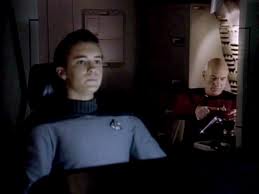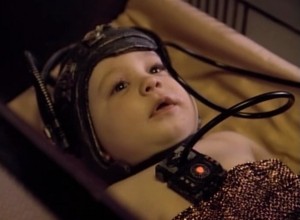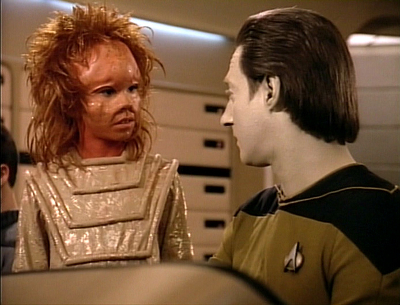I’m examining the impact Star Trek: The Next Generation had on my formation. The introduction to this series can be seen here.
TRIGGER WARNING: a lot of misogyny
Okay, 90% of the reason my Star Trek writing came to an abrupt stop a few months ago was that I came face to face with this story arc, and got creeped out. We’re gonna have to talk about what this means for a regular character… and that’s gonna make me sad. And angry.
Geordi… is a nice guy. In the worst, most obnoxious definition of that term. And the show reinforces every bit of misogyny behind the nice guy meme. *sigh*
We’re gonna talk about the third season episode “Booby Trap†and the fourth season episode “Galaxy’s Childâ€. (Yes, I’m jumping ahead a bit. Let’s just get this over with, shall we?)
Booby Trap
While investigating an archeological find, the Enterprise gets caught in a baffling trap that quickly threatens the whole ship.
The episode begins with Geordi awkwardly trying to seduce a woman on the Holodeck. I can remember growing up being told that a guy plotting to get his arm around a girl was a charming part of the courtship ritual, and that charm is a lot of what (I think) the writers are going for here. Unfortunately, the old “charming†idea – and Geordi’s entire preplanned date here – is predicated on the guy’s sense of entitlement and his lack of treating a woman as an individual. In this first scene, the episode still has a chance to go somewhere good. The whole point is that it doesn’t work for her. They’re sitting on a beach, uncomfortably. They’re hardly interacting. There is a violin player on the deserted beach with them… playing distracting “romantic†music. The music does nothing for her. He is giving her what he has decided a generic woman wants, without any clear attempts to communicate with the woman in question about her unique wishes, presumably so he can get something that he wants. It is ultimately a dehumanizing exchange he is trying to set in motion. When she gives him “the brushoffâ€, it’s clear he expects it, and immediately sulks. This scene sums up how Geordi objectifies women (which will continue to be revealed throughout the episode), and it has the potential to lead him to an awareness of that so he can grow. It’s a shame that potential is completely squandered.
Geordi later has conversations that reveal more of his inner thoughts. He asks one woman (Guinan) what she looks for in a man (assuming that, on some level, she can speak for all women as to what is attractive to them). He speaks in broad terms about his desire to take care of “somebody.†And he shares his confusion that he can make objects work well together in engineering, but can’t “make something work with a woman like Christie.†As an adult I can see him indicating he thinks women and objects share certain key attributes, and vaguely indicating some hierarchy of women where Christie is valued as a prize. But all of this was THE standard romance narrative when I was a kid first watching the show. Perhaps this is why Geordi was always just kinda there for me – not a threat that I yet noticed, but not a character I had much interest in. That standard narrative never made any sense to me.
While Geordi’s angst and my adult distaste unfold, the rest of the ship experiences an enjoyable, well-crafted puzzle that is technical without getting cluttered, and brings some well-paced action to the story. To explore every conceivable solution for the problem the ship is having, Geordi digs into prototype schematics and designers’ logs on the holodeck. He discovers that the head of the team that designed the ship is a Dr. Leah Brahms, who he immediately characterizes as “another woman who won’t get personal with me.” He gets bored only hearing her logs, so he has the computer build a hologram of her he can interact with. He is soon circling her motionless body asking her questions, but her dry answers are not enough. So he tells the computer to dig into her public presentations and personality analysis on file (side note: how is personality testing not more confidential information?) and add that data to the hologram. The holographic version of the powerful engineer is immediately warm, encouraging and intimate with Geordi, insisting he call her Leah, not Dr. Brahms. Within seconds, the woman who designed the Enterprise has moved from an unconsenting collaborating colleague to a fantasy woman for Geordi, with sultry exchanges like:
Lt. Geordi LaForge: I know my ship inside and out
Dr. Leah Brahms: Then you must know me, inside and out.
She soon offers to cook for him, and actually rubs his shoulders. It is not just an instant friendly working relationship. It is an instant romance – with a woman that never consented to the relationship. There is even a kiss; as the problem is solved and they part, the hologram of the woman who has never met Geordi says:
Dr. Leah Brahms: I’m with you every day, Geordi. Every time you look at this engine it’s me; every time you touch it, it’s me.
And they kiss.
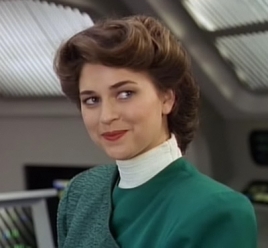
I’ve got a dozen advanced degrees, but my life goal is to cook you something hot, sailor!
So, instead of Geordi learning anything about how he objectifies women, he just spends the entire episode objectifying one. I’m fucking furious and my skin is crawling by the time this episode is done.
So, what would happen if the unsuspecting colleague – if the powerful and brilliant engineer – found out she was made Geordi’s plaything on the holodeck? Let’s find out. I’m CERTAIN she won’t end up apologizing for her own objectification. Surely not!
Galaxy’s Child
The head designer of the Enterprise visits the ship. The crew meets a space-dwelling creature as large as the ship itself, and gets entangled in complications regarding it and its offspring.
So, Dr. Leah Brahms is going to inspect the Enterprise. Geordi vocalizes such reflections on the woman he calls “Leah†– the woman he has never met – as “It’s not every day a man comes face to face with his dream”, “we worked as one” and “I just know Leah Brahms and I are going to be good friends”. He actually believes that he already has knowledge of her unique personhood, after interacting with the computer’s assumptions of who she is. This here is one of the more offensive moments among many offensive moments for me. I know we might get inured to this type of attitude in Western culture for a lot of different reasons. But to believe you have integral knowledge of a human spirit because you’ve seen a personnel file, or a holographic simulation (or a resume, or a performance, or a filtered interview in a paper)… it’s profoundly objectifying. Geordi honestly cannot tell the difference between reality and fantasy with this woman. She has gotten no direct input into how he already defines her.
When Dr. Brahms arrives, she is cool, professional, and irritated at modifications made to her ship designs. All of these rankle Geordi’s sense of entitlement a great deal, and during a low-lit supper in his quarters – where he uses his research on her to romance her – she ends up apologizing for her gruffness. In what I suspect is meant as endearing, she mentions that “people find me cold, cerebral, lacking in humor”, and with no attention paid to how sexism and misogyny across the centuries might shape these perceptions of her coldness, the brilliant woman decides she should try to be warmer to Geordi. But she soon rightly intuits that the boundaries in this relationship are FUCKED UP, and attempts to pull back from the romance Geordi is trying to push. He responds by – wait for it – sulking.
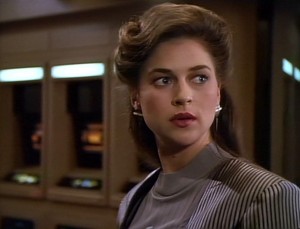
You’re not crazy, Dr. Brahms. He really did just pull that shit.
They find common ground again, Geordi pushes her again… even after discovering she is married. He perceives rejection and begins to characterize her as unfriendly, cold, and hateful. In the one brief bit of fresh air, Guinan calls him on his behavior, pointing out that he is angry that she is her own person and not meeting his fantasy expectations. He has a growth opportunity. But that opportunity, and this reality check offered by Guinan, are both dropped like a hot potato as the climax of Geordi’s, the writers’ and greater culture’s misogyny is reached.
In solving the episode’s technical problem, Leah finds Geordi’s previous holodeck recreation of her. She is RIGHTLY FURIOUS. She angrily confronts him about making her his fantasy plaything. Here he has an opportunity to show some integrity, own up to mistake and use this as a chance to learn something about relating to people. He instead lies, insisting it was only a professional collaboration. He plays his entitlement card again, emphasizing how hard he’s worked to be friendly to her and how he hasn’t been rewarded for that. And he gaslights her, characterizing her appropriate anger as jumping to incorrect conclusions and a great affront to him. He again laments the nice guy lament – she’s just so unfriendly, and he deserves better.
That, by the way, is the moment where I lose all respect for Geordi. He is entrenched in his shitty behavior and attitudes. And, as we will see, the writers are fine with that. It’s the object of his affections that has to come around.
Even as a kid, I remember thinking the end comes abruptly. The episode ends with the character of Dr. Leah Brahms laughing affectionately about the program that demeans her and APOLOGIZING repeatedly for her behavior. She characterizes her original irritation as she arrived as of equal sinfulness to his repeated boundary violations. AND… Geordi never once apologizes. For any of it. Not once.
I love a flawed and complex character, painted well and compassionately. But when that flaw does profound damage to others that is never acknowledged, and when that profound flaw is written off as a harmless quirk, things get fucked fast. When a “quirk†leads to someone being violated, it’s no longer something to laugh off. When systemic violation is ignored, the problem is perpetuated. Now I know Star Trek is always a product of its time and of its location in a Hollywood system. So, there’s going to be no such thing as a not-racist, not-sexist Trek. But the volume of misogyny not just portrayed but blessed in Geordi’s character arc here is just so overwhelming, so disheartening, so sad and angering. The crux of the nice guy script is not just the personal entitlement, but the “niceness†of it: the cultural sanction of it all, the writers’ sanction of it here, and the gaslighting of people who actually notice the fucked-up-edness. I didn’t get this nice guy entitlement script directed at me personally growing up — I was already both fat and genderqueer by puberty, and so I was not culturally the object of male sexual attraction. But of course the nice guy script permeated everywhere… even onto the Enterprise. It is some small consolation that at least awareness of this is growing and being shared to the point where there is language for it in some of the larger culture. That doesn’t solve anything in and of itself, but it’s a bit of acknowledgement for those of us who see to hold on to. It’s part of the process of standing up for ourselves and others, and moving toward justice.
In a later Trek series, these two characters – LaForge and Dr. Brahms – make an appearance as a married couple. That whole thing just creeps me the fuck out.
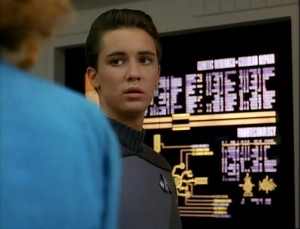
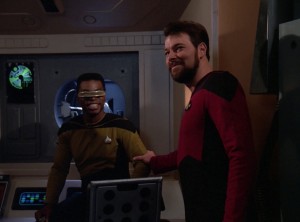
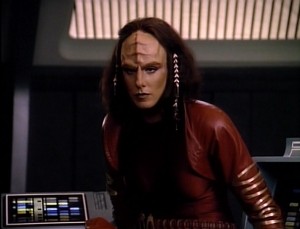


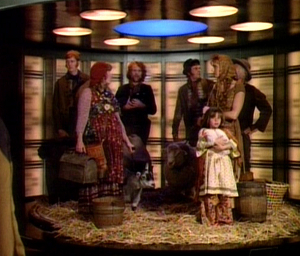 The reason I write about it here is that unquestionable taboos and heresies really intrigue me. As many times as Star Trek might have given me an opportunity to question my assumptions, it’s still written by humans, with certain values they won’t question and certain gaps in their self-analysis. Here, the issue is cloning. The second colony, comprised of scientists with great technology in tow, survived early devastating losses of population by cloning themselves and have in fact developed a distaste for sexual reproduction. They ask the Enterprise crew to donate DNA for cloning to help the colony survive certain survival-threatening limitations they’ve run into. Picard and company flat out refuse. It’s apparently a taboo subject. It seems that no one on board beyond the present away team is even asked whether they would want to contribute. The strategy that the colony itself has decided would be best for its survival is categorically rejected before discussion, and before consenting contributors are even sought out. There is, to my knowledge, no Federation law that would keep a consenting crew member from donating. But in place of asking, Picard explicitly states that it’s not likely anyone will want to. Riker passionately names individuality as an important value to him, and defines cloning as being in opposition to that. He believes having a clone would inherently diminish him. Picard seems to concur without discussion, and that’s that. There is no further exploration of the subject.
The reason I write about it here is that unquestionable taboos and heresies really intrigue me. As many times as Star Trek might have given me an opportunity to question my assumptions, it’s still written by humans, with certain values they won’t question and certain gaps in their self-analysis. Here, the issue is cloning. The second colony, comprised of scientists with great technology in tow, survived early devastating losses of population by cloning themselves and have in fact developed a distaste for sexual reproduction. They ask the Enterprise crew to donate DNA for cloning to help the colony survive certain survival-threatening limitations they’ve run into. Picard and company flat out refuse. It’s apparently a taboo subject. It seems that no one on board beyond the present away team is even asked whether they would want to contribute. The strategy that the colony itself has decided would be best for its survival is categorically rejected before discussion, and before consenting contributors are even sought out. There is, to my knowledge, no Federation law that would keep a consenting crew member from donating. But in place of asking, Picard explicitly states that it’s not likely anyone will want to. Riker passionately names individuality as an important value to him, and defines cloning as being in opposition to that. He believes having a clone would inherently diminish him. Picard seems to concur without discussion, and that’s that. There is no further exploration of the subject.
